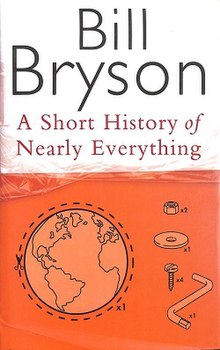A Short History of Nearly Everything
 |
|
| Author | Bill Bryson |
|---|---|
| Language | English |
| Genre | Non-fiction |
| Publisher | Black Swan (UK) Broadway Books (US) |
|
Publication date
|
2003 |
| Media type | Print (Hardcover, Paperback, E-Book) |
| ISBN | |
| OCLC | 51900381 |
| 500 21 | |
| LC Class | Q162 .B88 2003 |
A Short History of Nearly Everything by American author Bill Bryson is a popular science book that explains some areas of science, using easily accessible language that appeals more so to the general public than many other books dedicated to the subject. It was one of the bestselling popular science books of 2005 in the United Kingdom, selling over 300,000 copies.
A Short History deviates from Bryson's popular travel book genre, instead describing general sciences such as chemistry, paleontology, astronomy, and particle physics. In it, he explores time from the Big Bang to the discovery of quantum mechanics, via evolution and geology.
Bill Bryson wrote this book because he was dissatisfied with his scientific knowledge—that was, not much at all. He writes that science was a distant, unexplained subject at school. Textbooks and teachers alike did not ignite the passion for knowledge in him, mainly because they never delved in the whys, hows, and whens.
"It was as if [the textbook writer] wanted to keep the good stuff secret by making all of it soberly unfathomable."
Bryson describes graphically and in layperson's terms the size of the universe and that of atoms and subatomic particles. He then explores the history of geology and biology and traces life from its first appearance to today's modern humans, placing emphasis on the development of the modern Homo sapiens. Furthermore, he discusses the possibility of the Earth being struck by a meteor and reflects on human capabilities of spotting a meteor before it impacts the Earth, and the extensive damage that such an event would cause. He also describes some of the most recent destructive disasters of volcanic origin in the history of our planet, including Krakatoa and Yellowstone National Park.
...
Wikipedia
